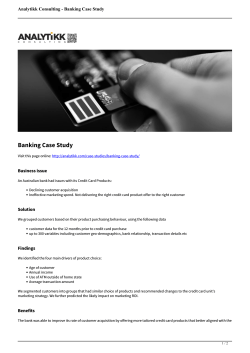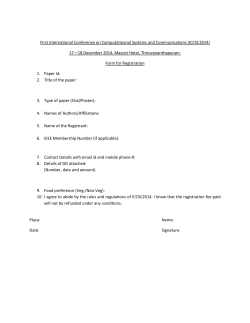
Active case finding in urban slums
Abstract N.6866 Active case finding in urban slumsExperience from a pilot under Axshya project in India Title: Category: Topic: Sub-topic: Content: Active case finding in urban slums- Experience from a pilot under Axshya project in India Public health practice A00 Tuberculosis A07 TB in special populations and institutions (e.g., migrants, hospitals, prisoners) Background and challenges to implementation: Active case search is relevant in urban slums going by the high risk of TB in slum dwellers, relatively lower level of awareness and less accessibility to TB diagnostic and treatment services. Thiruvananthapuram city, Kerala has 182 enlisted slums with a population of 66483. An urban slum based house-to-house active case search campaign was formulated as a pilot under Axshya project in selected four urban slums in Thiruvananthapuram in February 2014. Intervention or response: A 2-member team goes from house to house with a questionnaire. The team enlists all members of the household, with name, age and gender including children. Anyone who reports a cough of 2 weeks or more, or blood in sputum was identified as ‘probable TB’. They were then given sputum cups and explained how to collect a good sputum sample. The volunteers transported the sample to the nearest microscopy centre under NTP and the report was communicated back To gain the confidence of the community, meetings were conducted every week with community members especially the women’s’ help groups, wherein symptoms suggestive of TB gets explained and the details of the nearest diagnostic facility. The house-to-house survey was done after the meetings Results and lessons learnt: In the first month of pilot, 1707 people were screened from 364 households, given a family size of 4.8, which is quite high compared to average family size in Kerala. Close to nine percentage households had TB symptomatics (2.34% of total household members). More females reported to be symptomatic but all the three positives were males- giving a sputum positivity rate of 21% among males (see summary table). The survey is on going and all the households in the selected four slums will be covered in coming 11 months With a proper background setting by an awareness program, house-to-house screening in urban slums will help to identify TB symptomatics and will help to diagnose cases at the earliest. Sputum collection and transportation system should be in place to facilitate testing, else may lead to drop-outs Conclusions and key recommendations: Active case finding in urban slums is an important area to be prioritized in TB control efforts. Not only that the community is receptive to such interventions; the results are promising to help detect cases hitherto undiagnosed case. The NTP should involve more agencies and undertake similar active case finding efforts in the entire slum Submitted: Status: Keywords: Institutions and authors: Public health practice Not Yet Decided Urban slums, active case finding, axshya 1 Health Systems Research India Initiative Muhammed Shaffi1 Arun 2 2 The Catholic Health Association of India Joltin C1 3 The Union South-East Asia Office / International Union Against Tuberculosis and Lung Disease (The Union) Banuru muralidhara Prasad1 4 Global Institute of Public Health Muhammed Shaffi1 Powered by TCPDF (www.tcpdf.org)
© Copyright 2025













